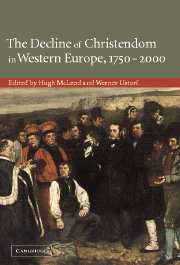Book contents
- Frontmatter
- Contents
- List of contributors
- Preface
- 1 Introduction
- Part I
- Part II
- Part III
- 9 The dechristianisation of death in modern France
- 10 The impact of technology on Catholicism in France (1850–1950)
- 11 Semantic structures of religious change in modern Germany
- Part IV
- Index of people and places
- Subject index
9 - The dechristianisation of death in modern France
Published online by Cambridge University Press: 03 July 2009
- Frontmatter
- Contents
- List of contributors
- Preface
- 1 Introduction
- Part I
- Part II
- Part III
- 9 The dechristianisation of death in modern France
- 10 The impact of technology on Catholicism in France (1850–1950)
- 11 Semantic structures of religious change in modern Germany
- Part IV
- Index of people and places
- Subject index
Summary
In his landmark work on eighteenth-century Provence, Michel Vovelle argued forcefully that changes in the language of wills suggested that a process of dechristianisation was well under way by the middle years of the eighteenth century. Vovelle based his work on a number of implicit assumptions about the relationship between death and Christianity in France that I would like to use as a starting-point for my discussion. First, and most obviously, Vovelle understood baroque devotional practices in the face of death to be crucial events for measuring the weight of Christianity in the lives of French men and women; indications that they might be less concerned with invoking the help of the clergy and the saints for their souls and those of their loved ones are equated with a lower level of commitment to Christianity in general. Second, Vovelle's work suggests that dechristianisation is a process driven by social and cultural forces that are deeply rooted and irreversible; a decline in the number of bequests for masses and other changes in wills provide an index for measuring this underlying trend. This assumption informs Vovelle's subsequent work as well, and is a dominant theme in his grand survey of death in Europe from the middle ages to the present.
Vovelle's work endures as a monumental achievement, but I would like at the outset to propose some alternative ways of approaching the relationship between death and Christianity that complicate the story that he told so well.
- Type
- Chapter
- Information
- The Decline of Christendom in Western Europe, 1750–2000 , pp. 145 - 162Publisher: Cambridge University PressPrint publication year: 2003
- 3
- Cited by



